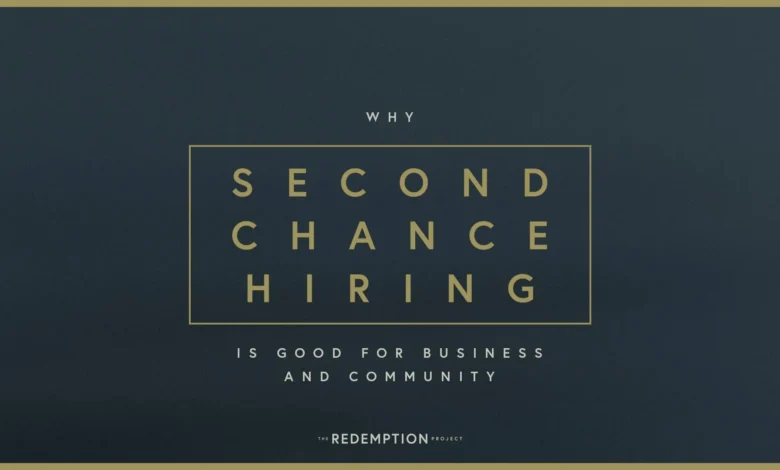Second-Chance Hiring And The Path Back To Work

It often proves challenging for individuals to get back to work following disappointments, especially individuals with convictions or those with long absences from work. Second-chance employment entails giving individuals the opportunity to get their lives back on track and boost the workforce. In doing so, not only do individuals receive assistance for their personal growth, but also businesses obtain motivated and focused employees. Businesses that participate in second-chance employment show their support for inclusiveness, diversity, and new opportunities. Individuals get the chance for stability with the right support, and businesses receive new talent and bolstered local communities. In this article, we shall look at definitions of second-chance employment, its benefits for employers, its capability of breaking down barriers, its employment of training and development of employees, and its facilitating of supportive working environments as facilitating easy return-to-work avenues.
What Second-Chance Means
Second-chance employment includes the practice of hiring people who may have had adversity in their record, such as imprisonment, long time away from employment, or recovery from drug and alcohol addictions. It means looking beyond an individual record and determining their potential for growth and productivity. This employment principle takes the view that any person deserves a second opportunity at changing their life and regaining independence. Companies practicing second-chance employment have found that these individuals gain strong motivation, resilience, and devotion for their workforce. For the employee, stable employment provides monetary security, higher self-esteem, and fewer opportunities for returning to bad ways. Second-chance employment connects yesterday challenges with tomorrow opportunities. It comes with much more than employment; it comes with dignity, responsibility, and the chance for individuals to feel valued for their ability rather than their record.
Benefits for Employers
Employers sometimes hesitate to take part in second-chance hiring, but there are real benefits when they do. Legacy Healing Center highlights how steady employment helps people in recovery stay on track, which in turn builds stronger communities and workplaces. For businesses, second-chance hiring can lead to motivated employees who are eager to prove themselves and stay committed.
- Lower turnover rates through higher employee loyalty
- Access to untapped talent pools with unique skills
- Positive company reputation for social responsibility
- Stronger team diversity and fresh perspectives
- Improved community ties and goodwill
By opening doors to individuals ready to make a change, employers often gain workers who value stability and show dedication. This not only helps fill positions but also builds a culture of support and inclusion. Second-chance hiring is a practical step that benefits both businesses and individuals, turning challenges into opportunities for growth and success.
Breaking Down Barriers
Many people ask how second-chance hiring helps reduce employment barriers. One common question is what challenges applicants face when returning to work. The most frequent issues include background checks, lack of recent work history, and employer hesitation. Another question is how businesses can lower these barriers. Clear communication, fair hiring policies, and training programs help create equal opportunities. Some wonder if second-chance hiring affects workplace safety. Research shows that with proper screening and support, individuals hired through these programs perform as well as, or even better than, traditional hires. Employers who adopt second-chance practices build a reputation for fairness and social responsibility, while also strengthening their workforce. By removing stigma and focusing on skills and potential, businesses make it easier for individuals to move forward. Breaking down these barriers opens the door to stability, growth, and healthier communities where more people can succeed.
Training and Skill Growth
Training and skill development are essential for making second-chance hiring successful. Employers who invest in learning opportunities give new hires the tools they need to succeed while building a stronger workforce.
Here are a few practical steps:
- Provide on-the-job training tailored to the role
- Offer mentorship programs with experienced staff
- Encourage participation in workshops or courses
- Create clear career advancement paths
- Use supportive feedback to build confidence
These small but powerful actions help individuals gain valuable skills while adapting to the workplace. Employees feel more capable, and employers benefit from higher performance and commitment. Training not only prepares workers for current roles but also sets them up for long-term growth, which strengthens both personal and professional stability. By focusing on skill development, second-chance hiring becomes more than just filling a position—it becomes an opportunity to build lasting careers and create mutual success.
Building Supportive Culture
A Midwest company described how second-chance employment affected their staff and community ties. The company began to offer opportunities for individuals with past convictions who wanted to work. One of the new staff members had not found stable work for years since he exited the correctional system. After training and coaching, he became one of the most reliable staff members. Not only did he arrive on time, he also had a positive outlook that motivated his staff members.
Employees who are hired through second-chance recruiting are 35 percent more likely to retain the same employer for the long term
Leaders of the firm saw greater overall morale due to the fact that employees took pride in working for an inclusive company. Managers found that giving individuals second chances fostered loyalty and reduced turnover. The firm also won the community’s respect for backing reintegration efforts. In this case, it has been found that second-chance employment has been more than a social good—second-chance work has been a practical business idea with advantages for both employers and workers.
A Path Worth Building
Second-chance hiring opens doors to those who deserve a fair opportunity to rebuild their lives. By combining training, mentorship, and supportive cultures, businesses create stronger teams and healthier communities. Every time an employer takes this step, they not only fill a role but also invest in long-term success. The path back to work is made smoother when companies commit to second-chance hiring, proving that a stronger future can be built through opportunity and trust.



